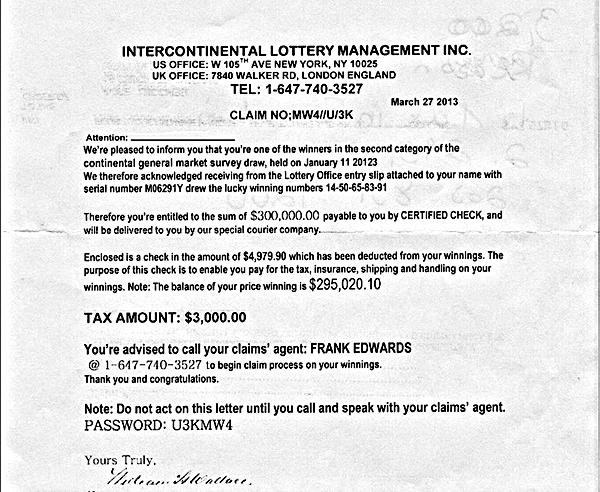Sac State Police warns of fake letter from University Foundation

April 23, 2013
Sacramento State Police warned earlier this month of a fake letter from the University Foundation at Sacramento State stating the recipient won an international lottery.
The scam informs the recipient they won $300,000 in a general market draw, and promises them the full amount once they deposit an attached check of $4979 to their personal checking account to go towards paying taxes for the cash prize.
The “winner” is then asked to send payment using these “funds” to Intercontinental Lottery Management Inc. Victims later discover the check they deposited was fraudulent and are unable to recover the money sent.
“These scams go on all the time (because) the victims are essentially good, trusting people,” Police Chief Mark Iwasa said. “When people tell them something, they believe that it’s true. That’s why these scams work because people think that other people are honest.”
Iwasa said he believes the scam shut down because the phone number included is no longer active, and the case has been transferred to mail fraud investigators.
While the same scam has been running since November, all of the recipients Iwasa knows of were from out-of-state.
They contacted the University Foundation to find out if the check was legitimate. Sac State Police reported the mail fraud to the FBI and Postal Inspector’s Office, but there are no potential suspects.
While the police department is not aware of any actual victims, Iwasa said the same scam has occurred for many years in different variations all around the world, and he believes it has worked at least a few times, albeit very rarely.
Detective Jason Johnston, the lead investigator of the case at Sac State, said while the fraud used publicly obtainable information, such as the University Foundation’s name, address and bank account and routing numbers, the campus has not lost any money.
Johnston said most of the recipients were from the East Coast, because it takes a long time for banks to send information and verify funds.
“It’s not until days later (the victims) find out the original check they cashed was actually no good,” Johnston said. “By that time, the person committing the fraud has already received the check and (the victims’ money) is gone.”
Johnston said he believes thousands of solicitations were sent, but is only aware of three people who received it. He does not know anyone who actually lost money as a result of the scam.
Vice President of University Advancement Vince Sales said the University Foundation is the philanthropic partner of Sac State, and exists to raise funds for the university for the benefit of students.
“(Our Board of Directors) are generous individuals who really want the best experience for Sac State students,” Sales said. “The Foundation exists to partner strongly with the campus in furthering its philanthropic goals.”
Sales said several protocols are in place to prevent fraud, such as heavy scrutiny of extraordinary checks and online copies of fraudulent mail.
“Being able to avoid being a victim of scams is just a matter of knowing information and understanding that they are people are out there that are unscrupulous and not honorable,” Iwasa said. “If it sounds too good to be true, it usually is.”
Police said each incident of mail fraud should be reported to the United States Postal Inspection Service.































































































































